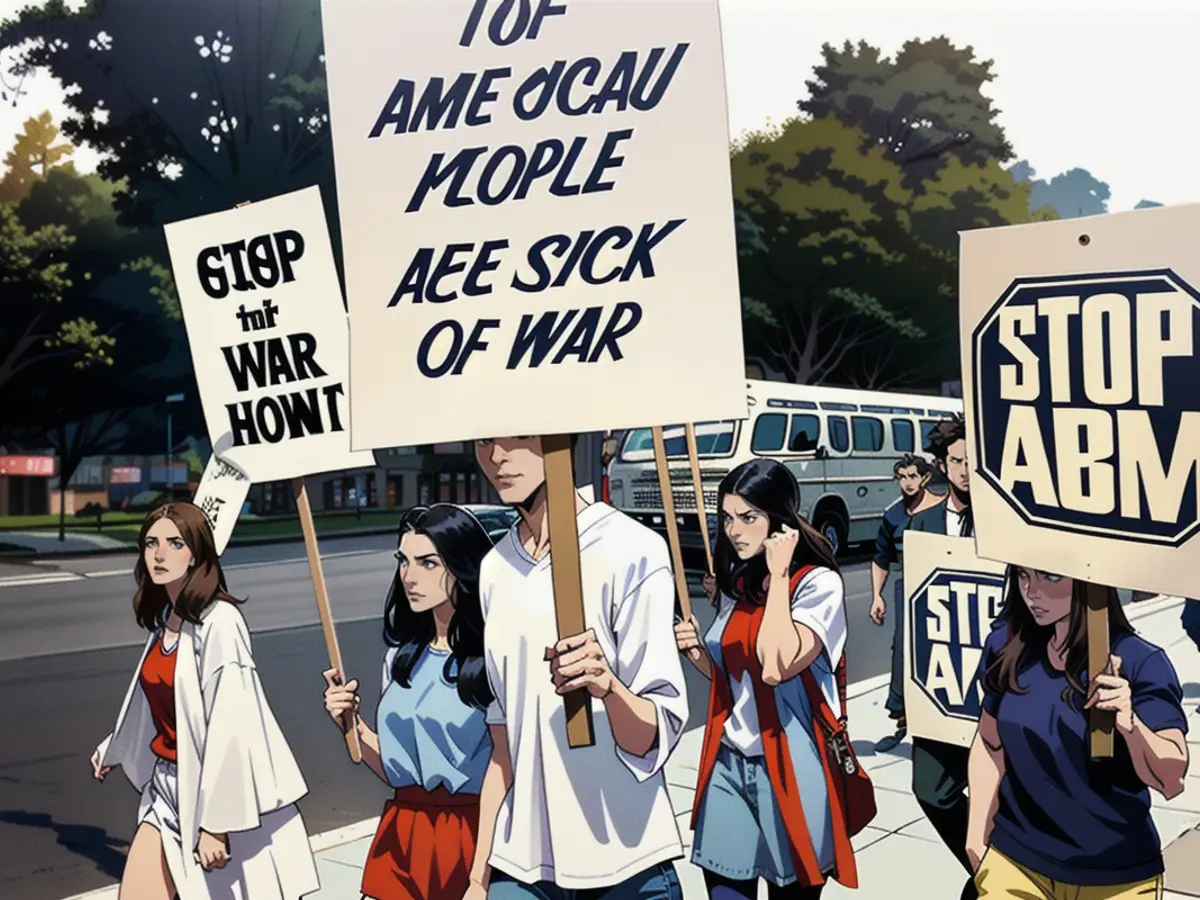Perspective: The events in Texas constitute a threat to American democracy.
On April 2nd, the university's president, Jay Hartzell, sent a shocking email announcing the dismissal and demotion of nearly 60 individuals due to the university's new compliance with Senate Bill 17, which banned DEI (Diversity, Equity and Inclusion) initiatives from every department except research and teaching.
Hartzell stated in his letter that "associate deans who were previously focused on DEI will return to their full-time teaching positions," while "the positions that provided support for those associate and assistant deans and a few staff roles throughout campus dedicated to DEI will no longer be funded." These individuals were not just numbers; they were members of our community who have been let go. This hasty decision prompted more than 500 professors, including me, to sign a letter expressing no confidence in the president.
The university's history of racial discrimination, sexism, homophobia, and transphobia adds more emotional weight to the dismissals. The "40 Acres" is a common phrase representing the pride that Longhorn Nation feels for this campus as a physical and imagined community. The struggle for racial integration at the university was a significant part of this community's history. The arrival of racial integration in the 1950s, following the Brown v. Board of Education Supreme Court decision, was met with hostility, making the campus inhospitable for Black students. Black students faced the denial of dormitory living, admission to fraternities and sororities, and general disrespect.
The growth of Black, Women and Gender Studies, as well as Mexican-American Studies, highlights the university's recognition of marginalized communities. However, the abrupt shutdown of programs that serve these marginalized communities is deeply disturbing. Many students have shared their fear, anxiety, disappointment, and depression with me. As faculty members, my colleagues and I have lamented the regression of racial justice in Texas and across the nation. Furthermore, we have been deeply saddened by the disappearance of so-called "allies."
The current situation is disheartening due to the reckless squandering of goodwill from the recent past.
The murder of George Floyd on May 25, 2020, sparked a national movement that forced an institutional confrontation with America's longstanding racial suppression.
While witnessing and actively participating in this history, I wrote for CNN, conducted many interviews, and delivered keynote speeches aimed at building a Beloved Community out of the ashes of centuries-long racial strife, political division, and police brutality.
At one point, it seemed that things were improving, as corporate America embraced the Black Lives Matter movement and racial justice, leading to new opportunities and recognition for employees of color. Meanwhile, universities added DEI programs to create a more inclusive environment for historically marginalized and underrepresented students and address past moral failures such as racial segregation.
The situation at the University of Texas at Austin requires much work to rectify its segregated origins. Established in 1883 as a segregated institution, the university opened its doors to its first Black student in 1950, Heman Sweatt, who did not graduate from the law school. The earliest Black Longhorns, known as the "precursors," faced a hostile racial environment, unable to live in campus dormitories, join fraternities or sororities, and experienced general disrespect.
Fast-forward to 2024. At the same time the university announced plans to establish a new School of Civic Education to prioritize viewpoint diversity that favors conservatives, it dismissed staff associated with DEI, a favorite target of the right.
As an outspoken scholar-activist whose work focuses on race, democracy, and power in the United States and around the world, I have closely followed the effects of the anti-DEI legislation and its impact on my students, colleagues, and staff. The nationwide political backlash against DEI and other issues, including the horrors in Gaza, has transformed campuses like Columbia in New York and Emory in Atlanta into tense battlegrounds, reminiscent of the conflicts between anti-war and Black Power advocates and law enforcement on campuses during the 1960s and 1970s.
However, UT is different from these other schools, as it has a public mission to use higher education to positively and life-alteringly impact Austin, Texas, and the nation. The university once had the largest DEI initiative in the country, the crown jewel of efforts to provide a top-notch education to students of all backgrounds.
The violence directed towards student protesters and the anti-DEI (Diversity, Equity, and Inclusion) legislation on campus are both pieces of a bigger movement to suppress speech and expression. They form part of a political climate that has also given rise to attacks on voting rights and reproductive justice, characterized by book censorship and threats against those with unpopular opinions.

I detest the rising anti-Semitism incidents on university campuses following the October 7 attack and long for the safe release of the hostages. Additionally, I condemn the surge of anti-Palestinian, anti-Muslim, and anti-Black sentiments in similar times.
Regrettably, the leaders have broadened the political and ideological disparities rather than building bridges for healing on campus. The far-right has resorted to fear, insults, and blatant lies to stifle freedom of speech and expression in higher education, marking the current phase of an ongoing endeavor to undermine public trust in these prestigious institutions.
For us intent on cultivating a thriving, multi-racial democracy in Texas, these attacks epitomize more than a blowback against the period I referred to as the country's "Third Reconstruction."
What we experience in Texas is a threat to national democracy. Much like Governor Ron DeSantis in Florida, Governor Greg Abbott's endeavors in Texas amplify the conservative legislators' intention of "recapturing" the university from a supposedly rampant "woke mob" filled with people who look like me.
I participated in two events on campus last week – one in support of Palestinians and free speech, with a small pro-Israel demonstration running concurrently, and the other a long-awaited rally backing DEI. At the same time, activists attempting to create encampments faced clashes with law enforcement, drawing undesirable attention to the community I cherish.
What terrifies me presently, amidst all this, are my highly motivated students and their supportive teachers and advocates in Austin. Their determination to work within the anti-DEI wave to further establish a multiracial democracy instills hope in me.
Standing in the scorching heat, conversing with students and acquaintances, crossing paths with familiar faces, and meeting new ones reminded me of the potential of higher education I encountered at the age of 17 in New York. My time at Stony Brook University bettered my life, propelling me to the platform where I am now.
Universities, encompassing both their pros and cons, are a mirror of our society and its continuous evolution of ideas concerning dignity, citizenship, and democracy. They are also engines of economic growth, job production, a thinktank for policy and technology advancements, a breeding ground for entertainment, sports, and art, and a nurturing ground for scientific, health, engineering, and legal innovations.
The humanities, which are typically undervalued, encompass the exploration of our moral, intellectual, and spiritual nature via inquiry and experimentation – a field essential to the well-being of universities and the nation.
This will not occur via the condemnation of DEI programs, the repression of student protesters, or the intimidation of faculty and staff. What transpires at these institutions can indeed influence the world, but not unilaterally. April has demonstrated that universities can be weaponized to quash dissent and limit liberty of speech and expression.
"What starts here changes the world": This proverb can only regain its shining connotation if we, the students, teachers, and staff, act as one to uphold the ideals of a just university. And I, for one, still trust in the might of a fair institution and am prepared to stand up for it.

Read also:
- This will change in December
- Dikes withstand water masses so far - Scholz holds out the prospect of help
- Fireworks and parties ring in 2024 - turn of the year overshadowed by conflicts
- Attacks on ships in the Red Sea: shipping companies avoid important trade route
In light of the university's actions, many faculty members have expressed their disagreement and concerns, stating that the dismissals undermine the university's commitment to diversity and inclusivity, and represent a threat to academic freedom.
The aftermath of the dismissals has sparked intense debate among students, faculty, and the broader community, with many voicing their opinions on the university's decision and its impact on the campus culture.
Source: edition.cnn.com







